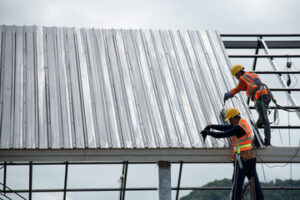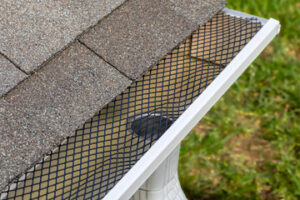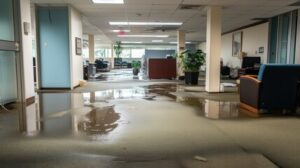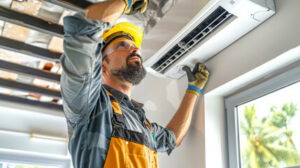Metal roofs have many benefits, including durability, energy efficiency and aesthetics. However, like any other roofing system it must be properly maintained to ensure it performs its best.

Always use fall protection when working on your roof, and have a professional perform any repairs or maintenance that require walking on the surface (this includes inspections for leaks). Regularly inspect your metal roof for scratches, scuffing, flaking and excessive chalking or color fading. Contact Metal Roofing Winston Salem for professional help.
The durability of metal roofing is a top selling point for many homeowners. It is a resilient material that can stand up to heavy snowfall and hail. The longevity of a metal roof can also reduce cooling costs and add value to your home. It can also help you save money on homeowner’s insurance rates.
While there are a variety of metal roofing materials available, the most popular choices tend to include steel, galvanized steel, and zinc. These materials are known for their strength and protective properties, and a properly installed roof can be expected to last for up to 100 years.
Compared to traditional shingles, metal roofs are much more resistant to wind damage. They can withstand winds up to 140 miles per hour, making them an ideal choice for homes in hurricane-prone areas. Additionally, the strength of a metal roof can improve building stability and potentially reduce the need for costly structural repairs.
A metal roof can withstand the elements for years, but it does require regular maintenance to protect against corrosion and other issues that might occur. This includes routine inspections, a focus on keeping the roof free of debris, and addressing any drainage or water management problems. In addition, a periodic treatment with a waterproof sealant can help to extend the lifespan of your metal roof.
One concern homeowners have about metal roofs is that they will rust or corrode over time. While this may have been true in the past, today’s metal roofs are made with protective coatings that withstand rust and other environmental factors.
While a metal roof is more expensive upfront than other commercial roofing options, it has a longer lifespan and requires less ongoing maintenance. This can make it a smart investment for businesses that want to save on cooling costs and minimize the impact of roofing replacements. The durability of a metal roof also contributes to energy efficiency by reflecting sunlight away from the building during the summer.
Energy Efficiency
The idea of a metal roof being energy efficient may sound counterintuitive. After all, doesn’t metal absorb the sun’s heat and turn your house into an oven? However, when properly installed, metal roofs actually reflect the solar radiant heat, decreasing interior cooling costs and reducing peak demand for air conditioning. This allows for significant savings in energy bills, helping your roof pay you back for its service over 40 to 70 years and beyond.
Additionally, the reflective properties of metal roofs also diminish the urban heat island effect, allowing them to contribute to overall sustainability in communities. In addition, metal is the world’s most recycled material, limiting reliance on raw materials and landfill waste. It also lasts longer than asphalt shingle roofs, meaning it requires less replacement over time, and its durability contributes to a lower carbon footprint.
Another benefit of a metal roof is its ability to quickly and easily shed snow and rain. This minimizes water leaks and protects the roof’s structural integrity, reducing repair and maintenance costs.
Finally, unlike shingles that can be damaged by hail or other weather events, metal is engineered to resist damage from high winds, heavy rains and debris. This allows homeowners to enjoy their roofing’s beauty and functionality without worrying about costly repairs or replacements.
Choosing the right metal roofing for your home depends on your budget and preferences. While upfront costs for metal roofing can be higher than other materials, they offer the advantage of a long lifespan and minimal maintenance requirements. It is important to set a realistic budget for your project and include all potential costs including the panels, metal trim, underlayment and accessories.
The team at CoMo Premium Exteriors can help you determine which type of metal roof is right for your home in Seattle. Contact us today to schedule your SmartMatch Needs Analysis.
Aesthetics
A metal roof offers a sleek, contemporary appearance that elevates the look of any structure. Its innate durability and extensive array of color options enable property owners to achieve their desired aesthetic while enjoying the long-term beauty and value of their home or commercial building. The choice of roofing material and color is an important factor in the overall appearance and character of a building, as it is responsible for creating harmony between the structure and its surrounding environment. In addition to a range of standard and custom color options, metal roofing also offers a variety of textures that provide additional design flexibility.
The luminous quality of metallic roofing can enhance the aesthetic of any building, with the gleaming panels reflecting the sunlight and illuminating its surroundings. When paired with natural landscaping and the changing colors of the seasons, this effect becomes even more striking. Additionally, the reflective properties of metal roofing offer an energy efficiency benefit, reducing cooling costs during warm months.
In addition to the luminous quality of metal roofing, its texture can add depth and complexity to a building’s exterior, further enhancing its visual appeal. A variety of finishes are available, including matte, glossy, and weathered. In particular, a textured finish can complement architectural styles that feature an industrial aesthetic, blending seamlessly with the modern design of standing seam or metal shingles.
In contrast, a textured finish can also complement traditional aesthetics, such as those found in Mediterranean or cottage style buildings. With the ability to emulate the appearance of wood shakes, slate, or clay tile, metal roofing is a suitable option for homeowners who want to preserve their heritage homes’ classic charm while incorporating the durable benefits and energy efficiency of metal.
Property owners can customize the appearance of their metal roof by combining a wide variety of style and color options to achieve their ideal aesthetic. In addition to coordinating with the exterior paint and trim, the color of a metal roof can play a role in the building’s energy efficiency. Lighter shades reflect more sunlight, reducing solar absorption and potentially decreasing cooling costs during warmer months, while darker colors absorb heat, keeping the building comfortable in cooler climates. Other factors to consider when selecting a color for a metal roof include its opacity and neighborhood or homeowners’ association regulations.
Maintenance
A metal roof is built to withstand the elements, but it still requires regular maintenance. It is important to regularly inspect the roof, particularly in the fall and spring, and address any issues promptly.
Dents or dimples in a metal roof are indicative of impact damage, and should be repaired immediately. Leaks and water stains are also signs of trouble and should be addressed as soon as possible. Loose screws and panels are another concern, as they can allow water to penetrate the roofing structure.
It’s also a good idea to regularly clean your metal roof with a non-corrosive, non-abrasive cleaner (following manufacturer’s instructions). Organic materials like leaves and twigs can cause moisture buildup, which may lead to corrosion. In addition, if these materials become stuck in valleys and other low points on the roof, they can collect water and become a source of leaks. It is also important to regularly clean gutters and downspouts, as debris can easily clog them.
If your metal roof has a protective coating or sealant, it’s recommended that you reapply them every 5 to 10 years to ensure continued protection from UV rays and moisture. This is a simple process that can be completed by a professional and can help to extend the life of your roof.
It is also a good idea to regularly check for cracks, chips and other damage, and paint touch-up is available from Central States in a variety of colors that match the original finish of your metal roof. It is recommended that you always use a roof coating or sealant specifically made for metal panels, as using the wrong product can damage the finish and void any warranty.
Finally, it is crucial to make sure that all personnel who are working on the roof are wearing appropriate safety gear and following established safety procedures. It is also important to avoid walking on the panel seams, trim or any other parts of the roof that aren’t designed to support weight.






